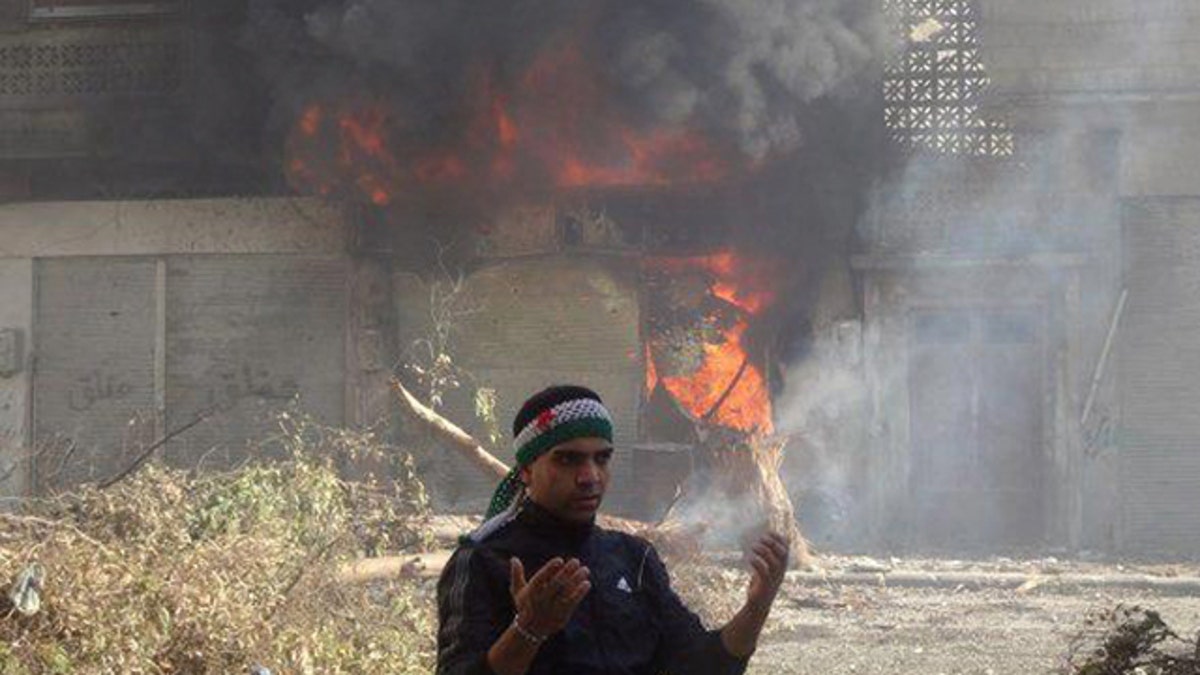
Feb. 12, 2012: In this citizen journalism image provide by the Local Coordination Committees in Syria, an anti-Syrian regime man reacts in front of flames which rise from a burning shop damaged by Syrian government forces shelling, in Baba Amr neighborhood in Homs province, central Syria. (AP)
UNITED NATIONS – The U.N. human rights chief decried Syria's escalating crackdown on civilian protesters Monday and warned that the Security Council's failure to take action has emboldened the Syrian government to launch an all-out assault to crush dissent.
Navi Pillay expressed fears that the deliberate stirring of sectarian tensions may plunge Syria into civil war. She said there are strong indications of ongoing crimes against humanity and again appealed for President Bashar Assad's government to be referred to the International Criminal Court.
Standing before the 193-member General Assembly, Pillay said tens of thousands of people, including children, have been arrested, more than 18,000 reportedly are still arbitrarily detained, and thousands more are reported missing. Another 25,000 people are estimated to have sought refuge in neighboring countries, and more than 70,000 are estimated to be internally displaced, she added.
The General Assembly is expected to consider a nonbinding resolution similar to the Security Council resolution that Russia and China vetoed on Feb. 4.
The resolution backs an Arab League plan that calls for Assad to hand power to his vice president and allow creation of a unity government to clear the way for elections. There are no vetoes in the assembly, and diplomats said a vote on the Arab-sponsored resolution could take place late this week.
In her speech, Pillay deplored the ongoing assault on the central city of Homs, which reportedly has killed 300 people in the last 10 days, and said her office has received similar accounts of intensifying assaults and worsening humanitarian situations in Zabadani, Dar'a and al-Rastan.
"The risk of a humanitarian crisis throughout Syria is rising," she said.
Pillay said credible reports indicate more than 5,400 people were killed last year, including military personnel who refused to shoot civilians. She said it's been almost impossible to update the death toll in the past two months because of the extreme difficulty in verifying events on the ground, but "we are certain that the number of dead and injured continue to rise every day."
"The nature and scale of abuses by the Syrian government indicate that crimes against humanity are likely to have been committed since March 2011," Pillay said.
"Furthermore, the breadth and patterns of attacks by military and security forces on civilians, and the widespread destruction of homes, hospitals, schools and other civilian infrastructure indicate approval or complicity by authorities at the highest level," she added.
Pillay stepped to the podium after a lengthy failed attempt by Syria to prevent her appearance.
Syria's U.N. Ambassador Bashar Ja'afari argued Monday's meeting was illegal because the General Assembly resolution establishing the Geneva-based Human Rights Council only allows the human rights chief to report once during its session.
At a meeting Sunday, the Arab League proposed a joint peacekeeping mission in Syria with the United Nations, which would require adoption of a Security Council resolution.
Russia's U.N. Ambassador Vitaly Churkin, whose country is Syria's staunchest backer, expressed regret that Monday's meeting was held.
He urged countries with influence to pressure Syria's opposition to sit down with the government to adopt a new constitution and prepare for multi-party elections.
Churkin said the proposal for a joint peacekeeping force "requires careful consideration" and over the next few days Russia will contact the Arab League "to clarify legal and practical possibilities."
"If you have a peacekeeping mission, you need peace to keep," he said. "In other words, first of all you have to agree on some kind of cease-fire. Unfortunately, the armed groups opposing the regime do not answer to anyone and they're not controlled by anyone."
Ja'afari reiterated his government's charge that the violence in Syria is the fault of armed terrorist groups, pointing to calls by al-Qaida leaders, including a weekend video message by the terrorist group's chief Ayman al-Zawahri, for Muslims to support the Syrian rebels.
Libyan Deputy Ambassador Ibrahim Dabbashi compared officials from Assad's government to those of former Libyan leader Moammar Gadhafi's regime, saying citizens both countries had to "suffer at the hands of a devilish regime."
He predicted that "the Syrians will meet the same destiny" as Libya's former leaders.
